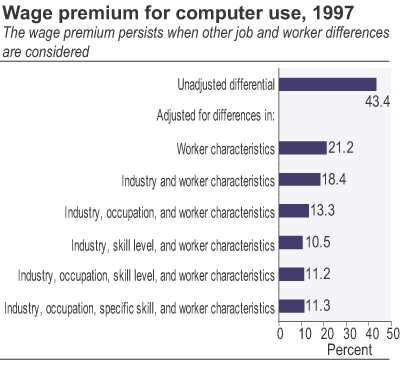"Digital Divide" Not to Blame for Rural Earnings Shortfall
- by Lorin Kusmin
- 4/1/2003
Workers who use computers on the job generally receive higher wages, suggesting that some workers without computer skills or access to computer technology may be disadvantaged. On-the-job computer use is less common in nonmetropolitan (nonmetro) areas than in metro areas, and wages for nonmetro, or rural, workers are generally lower. But does lower computer use explain the metro-nonmetro wage gap?
In 1997, on-the-job computer users earned 43 percent more than other workers in the U.S. However, this wage gap reflects not only computer use but also differences in worker education and skill level, occupation and type of industry, and other worker and job characteristics. After accounting for these differences, a wage premium of about 11 percent remains associated with on-the-job use of computers.
On-the-job computer use was significantly more common in metro areas (52 percent) than in nonmetro areas (40 percent) in 1997. Still, greater computer use in metro areas combined with higher wages for computer users accounts for only a small portion of the overall metro-nonmetro wage gap.
ERS research shows that the wage premium associated with computer use in nonmetro areas is about 6 percent, less than half the 13-percent premium in metro areas. Moreover, other measured job or worker characteristics do little to explain this difference in wage premiums. Rurality itself appears to dampen returns to worker skills, suggesting lower employer demand for skills in nonmetro areas. Because of the lower level of return to computer skills in rural areas, nonmetro workers who use computers on the job (two-fifths of all nonmetro workers) appear to lose out on an additional wage premium that they would receive if employed in metro areas.
As returns to computer use on the job are smaller for rural workers, improving the computer literacy of rural workers may contribute only slightly to reducing urban-rural wage inequality. While computer training may benefit workers in nonmetro areas, those workers may need to relocate to gain the most employment benefits. Computer literacy programs may also improve the earnings of some racial and ethnic minorities, who experience a much larger computer use wage premium.
With the explosive growth in the economic significance of the Internet in the late 1990s as well as current efforts to expand broadband services to rural areas, the potential is great for increases in the returns to computer skills in rural areas. Clearly, we will need to revisit the 'digital divide.'
This article is drawn from:
- Kusmin, L. (2002). Wage Premiums for On-the-Job Computer Use: A Metro and Nonmetro Analysis. U.S. Department of Agriculture, Economic Research Service. RDRR-95.


